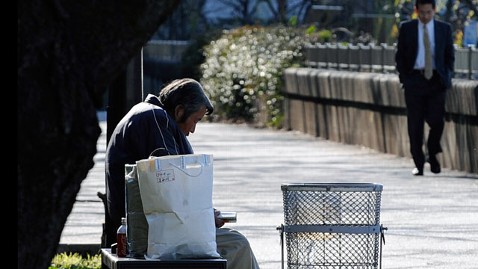'Lonely' Starvation Deaths Prompt Soul-Searching in Japan

(Image Credit: Toshifumi Kitamura/AFP/Getty Images)
It took more than a month to discover the bodies.
Japanese police say the family of three - a couple in their 60s and a son in his 30s - likely starved to death in their own apartment in Saitama Prefecture, just outside of Tokyo. Their refrigerator was empty, their electricity and gas shut off, their rent had gone unpaid for six months.
Police only arrived at their home this week after rent collectors called, asking them to check on the family. The bodies were badly decomposed. A few one yen coins, some candy, and water bottles were all that remained.
Neighbors oblivious to the plight of the family said they hadn't seen the three in months, but never checked in on them.
One neighbor told reporters that the mother asked her for financial help, saying she was in trouble because of her husband's illness. The neighbor declined and encouraged the woman to apply for welfare instead, but she never did.
The troubling case has raised questions about the safety net in place for the neediest families in Japan, the world's third-richest country. It has also prompted soul-searching among those who see community ties thinning, and a society increasingly looking inward.
"This is not something you'd expect in a developed country like Japan, but people are struggling to find jobs," Norimichi Goishi of the Tokyo Institute for Municipal Research said in an interview with broadcaster NHK. "Local officials can't always reach those in need. Deaths related to starvation are a lot more common than we think."
More than 700 people have died of hunger since 2000, according to the Ministry of Health, Labor and Welfare, although experts suspect the actual numbers are higher.
The cases are known as kodokushi or "lonely deaths" in Japan - and the stories are familiar: Unreported deaths, unpaid rents, no food, no electricity, and few ties to family and friends. Many are too ashamed to ask for help.
Five years ago, police in the southern island of Kyushu discovered the body of a 52-year-old man, six years after his death. He had been living alone on welfare, but refused payments just before his death. Two sisters in their 40s were found dead last month in their apartment in Sapporo, in the northernmost island of Hokkaido. They were living without heat, despite sub-zero temperatures and heavy snowfall.
Just last week, Tokyo police found the body of a 45-year-old mother and her 4-year-old son in their apartment, months after their deaths. Investigators suspect the woman died of a hemorrhage, the son of starvation. He weighed 20 pounds when police found his body, lying on the couch.
The city's welfare division said the mother had applied to receive free diapers, and was in touch with a case worker every month. That worker visited the apartment in January after calls to the mother's cellphone went unanswered, but she was unable to determine what happened to the two until police checked on them at the request of relatives.
In Saitama, a social worker told NHK there was little the city could have done to help the three family members who died, considering the circumstances. "We drive around to check in on the elderly and people who live alone, at least every 10 days," she said. "We had no information on this family. We had no idea [of their existence]."
The family never registered with the city and received no public assistance, according to officials.
The men worked in construction but fell behind in rent payments when a back injury forced the father to quit his job, according to the Asahi Shimbun. Officials who spoke to the newspaper said the ward's water department, aware of the family's financial situation, kept the water running despite delinquent payments.
When the woman told an employee that her husband had been hospitalized, the worker urged her to talk to the welfare department, but she reportedly never did.